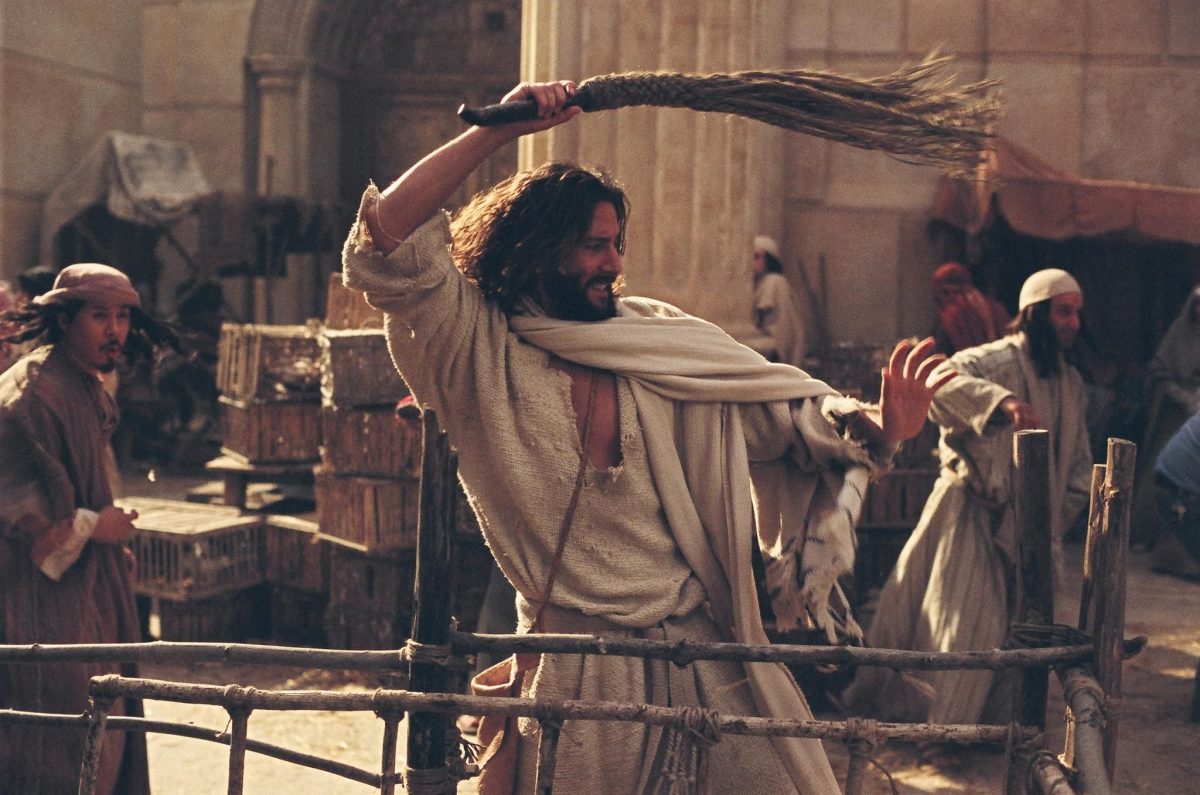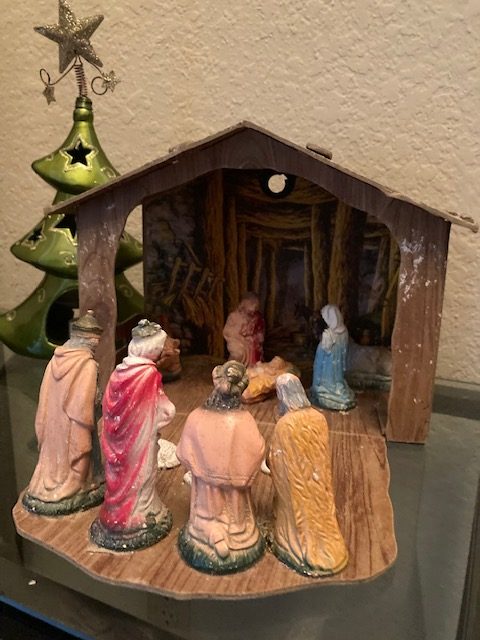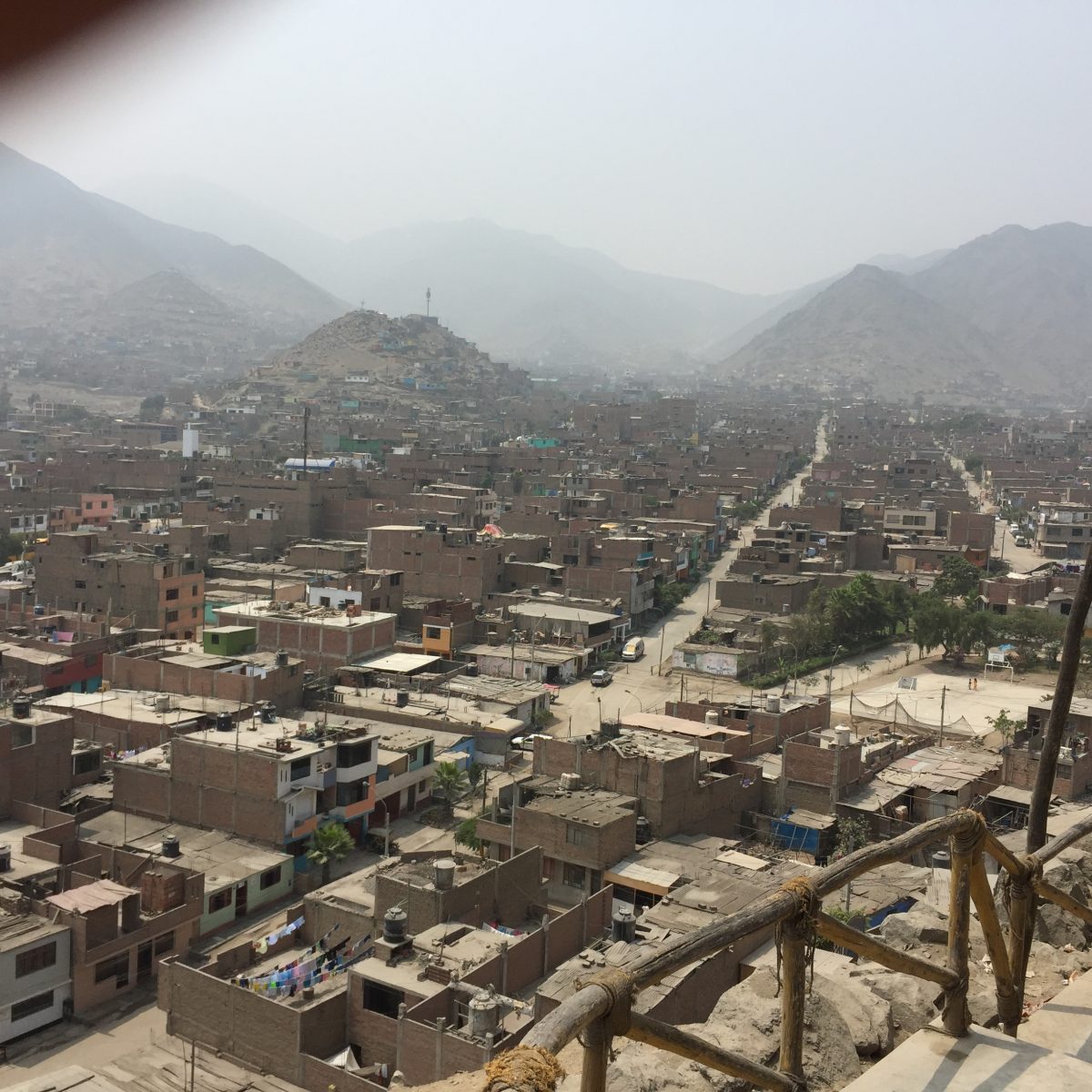Background Passages: Mark 11:15-17; Psalm 100:4
If we aren’t careful, reading scripture can become too common place. We hear or read a story enough times and Jesus becomes a two-dimensional character we place on the felt board of our lives as the story unfolds.
When we’re able to make Christ real, the story fleshes itself out in colorful, three dimensions that gives us a new way of looking at God’s truth and inspires us to live life more abundantly.
Three verses in Mark. Four quick sentences. These 78 words tell the story of Jesus physically clearing the temple in a moment of righteous anger. It is an intense passage. I don’t know that it happened exactly like I envision it, but you don’t know it didn’t. Read with the intent of learning what it means to make his house a house of prayer and inclusion.
She shuffled inside the temple through its eastern gate,
caught in a stream of
hurrying humanity.
Pressing.
Pushing.
Prodding
An exhausting effort to
pass through the portal.
The massive crowd created an instant bottleneck.
at the narrow opening
Hundreds tried to enter
like sheep herded into a pen.
The petite, elderly woman.
Jostled.
Jolted.
Jammed through the gateway.
Once inside,
some hurried soul shoved her to the side.
Knocked her off balance,
scraping her wrist of the rough, stone wall.
She scanned the courtyard of the women,
rubbing the abrasion on her hand.
Blaring noise.
Braying animals.
Barked insults.
Smells and sounds stunned her senses.
Every face that passed reflected a patience worn thin
by long lines.
Angry haggling.
Inhospitable hearts.
Slowly she meandered through the booths,
handing over her temple tax to a scowling priest.
Paying her pennies
for a sacrificial dove.
Exorbitant fees left two coins in her bag.
A Jewish convert from Syria.
A trip of a lifetime.
A demanding and dangerous
journey to Jerusalem.
In her heart,
worth every toilsome step to pray
to the living God.
In His home.
His temple.
Pictured this moment in her heart for years, but
she never expected such…
unholiness
in this most holy place.
Passed through the masses
deeper into the Court of the Gentiles.
Seeking a quieter place to pray.
Hawkish vendors pawed at her arms.
Plying their wares.
When she did not buy,
they pushed her away.
Cursed her family.
Cruel words.
Contemptuous sneers.
She moved again,
longing to feel God’s presence in
his temple.
Once…
Someone arguing at an elder of the temple
broke her reverent conversation.
Twice…
Someone yelled at her
as she settled to her knees.
Three times…
Someone shoved her against the wall
as they jockeyed for position.
Tears flowed down her wrinkled face.
Tired.
Traumatized.
Disillusioned.
Disheartened.
*****
A few minutes before,
Jesus and his disciples entered the temple court
through the same eastern gate.
A long journey from Capernaum
in obedience to the call of Passover.
The last Passover
before the passion
of the cross.
Jesus steeled himself against the revulsion he felt
every time he entered the unruly atmosphere.
Particularly rowdy and quarrelsome this year.
Muttered to his disciples
“How can anyone worship like this?”
Worked his way through the crowd
Brushing aside the moneychangers and sellers.
Hearing the relentless haggling over
price and
product.
Anger boiled with each passing moment.
Jesus’ head snapped to a commotion on his left.
An elder in the Temple.
Shouted and shamed
a man who refused to pay the asking price for a
blemished lamb.
A lamb unsuitable for sacrifice.
Unworthy of God’s blessing.
Too late Jesus stepped to intervene.
The elder drove the man back
with fisted rebuke,
pushing him into and over an elderly woman
kneeling at the wall,
offering her prayers amid the
chaos and confusion.
The master could tolerate no more.
Grabbed two cords from a vendor’s stand.
Wrapped them around his wrist.
Held tightly in his calloused hand.
A crack of the improvised whip.
A shout that bounced off the temple walls,
Jesus cried out,
“Enough!”
People spun around.
Stared.
Shocked.
The old Syrian woman backed against the wall.
Avoided the man in the dusty robe as he charged by.
She watched in awe as he…
Moved quickly to a moneychanger’s table,
tossing it aside as if it were made of papyrus.
Scattered a bag full of coins
across the dusty ground.
Pushed over a nearby fence holding a small herd of sheep.
Drove them toward the gate and
outside the temple
People scattered.
Ran from the man with furious eyes.
Above the din,
she heard again…
“Enough!”
Picking up an armful of cages holding the doves,
the man shoved them forcefully
into the arms of a temple guard.
“Take them and go!
Now!”
The elderly woman startled in fright.
A burly merchant jumped in front of the man.
Beefy hands stretched out to stop him.
Eyes intent on malice.
The man with the whip froze.
Held the index finger of his right hand
inches from the merchant’s face.
Dark eyes glared at the storekeeper.
An explicit,
unspoken
message.
“Don’t even think about it!”
The merchant cowered.
Grabbed his possessions.
Fled toward the gate without looking back.
The woman stood with her mouth agape.
Fascinated by the
presence and power
on display.
As he encountered each Gentile worshipper,
he looked intently into their eyes.
Urged them,
“Please wait.”
Then, in a whirlwind of God’s wrath,
He turned to another merchant,
driving them from the temple.
A swirl of dust.
The man stretched out his arms.
Grabbed the edge of the heavy wooden gates.
Watched the mass of fleeing humanity.
“My Father’s house is for all nations a house of prayer.
You have turned it into a den of thieves!”
“Enough!”
Slammed shut the doors.
Sealed the ensuing silence
into the courtyard of God’s temple.
The elderly woman and dozens of desiring worshippers
Stood still.
Shaken.
Silent.
*****
Jesus stood still at the entrance
breathing heavily.
Head bowed.
Tears of sadness stained dusty cheeks.
Rubbed his eyes and face
as he calmed his emotions.
Troubled worshippers…
Clung tightly to one another.
Clustered in tiny groups,
gathered across the courtyard.
Shocked priests…
Huddled in the far corner.
Trembling in a mixture of
terror and temper.
Stunned disciples…
Stood slack-jawed amid the overturned tables.
Astonished at the demonstration of physical power
never seen from their Lord.
Jesus looked at his closest friends.
Exhaled deeply.
Puffed out his reddened cheeks.
Shook his head slightly and…
with visible relief, winked.
“I’m okay.”
Jesus scanned the silent assembly.
Looked intently for the elderly woman caught in the middle.
He found her.
Crouched in a corner.
Leaning against the wall.
Knees pulled tightly to her chest.
He sat down beside her.
Smiled a self-conscious grin.
“I’m sorry you had to see that,
but I know you came to worship our God.”
They sat for a moment in silence. Jesus breathed deeply.
He pushed himself upward,
pressing his back against the stone wall.
He took her hands.
Led her to the center of the courtyard,
calling for the others to join him.
In the stillness of that moment,
Jesus led them in quiet prayer.
He motioned to the frightened priests.
Signaled them to quietly accept the offered sacrifices.
One by one.
The worshippers relinquished their tribute.
Moved to a quiet place.
Offering private praise
to the Lord Almighty.
Jesus watched the prayerful pass.
Spoke quiet words of encouragement.
The old, Syrian woman
moved slowly in the line of worshippers.
Waited for her moment to offer her dove to the priest.
As the line moved slowly forward, she
stopped in front of the man who cleared the temple.
With a look of gratitude
she raised a shaking hand, translucent with age,
placed it delicately on his cheek.
Patted it twice.
Inner joy bursting forth in a near toothless smile,
erasing 20 years from her elderly features.
Laughing quietly,
Jesus offered his arm.
They shuffled to a quiet corner.
Knelt together in the dust.
Offered more words of praise and worship to the Father.
What made this Passover different? The same chaotic scene played out every year upon Jesus’ arrival for Passover. The crowds. The clamor. The irreverence.
Every time he came to the temple, Jesus surely winced. Overwhelmed by the cacophony within the courtyard. Sickened by the difficulty of worshipping amid the clamor.
Yet, he never reacted outwardly to his inner revulsion…never yielded to the rising bile of anger in his throat.
The disturbance this time triggered a different response. This time he would enter Jerusalem’s temple for the last time…on his way to the cross. Jesus chose this time to make a bold statement about worship so seriously misunderstood and misrepresented by the myopic temple authorities.
In a graphic way Jesus reminded them that God’s house is a place of reverence.
In a graphic way Jesus confirmed that personal prayer lies at the heart of worship.
In a graphic way Jesus warned against attitudes and behaviors that impede the worship of another.
In a graphic way Jesus insisted that God’s house would be an inviting place of prayer…for all nations. For all people.
Imagine a church today with no distractions. No dissension. No disdain for the different.
A church with no elitism. No exclusivity.
A church with no arrogance. No attitude that shuns the seeker. No action that serves as a stumbling block to real worship.
Imagine a church with its doors and hearts wide open. Ready for worship.
A church for whom God’s house echoes with prayer and praise…for all people.
Just imagine.
Then…
Make it so.
“Enter his gates with Thanksgiving; His courts with praise, Give thanks to Him and Praise His name.” (Psalm 100:4)
Author’s Note: The article above is a chapter pulled from one of my books, The Chase: Our Passionate Pursuit of Life Worth Living. If you’re interested in purchasing a copy of the book, leave a message on the comment section below.



